Hafsa tagged me to post pictures of my bookshelf online, after Faraz started the general tag.
So, after some painfully hilarious attempts with my absolutely awful camera (sorry people!), I managed to get my books up :) Only for you Haffi!
My books almost reflect my absolutely disconnected interests. Most of the newer ones are catalogued on my LibraryThing. I think I'm also going to join BookMooch...
My collection includes books on professional development, Islam, fitness, some ficition, social causes, cooking and natural medicine. I often wonder how that comes together I have some 200 books lying in the store on British/European English fiction from my school days... Wouldn't it be amazing one day to go back and read them all again? But life's too short for that, and there's too much to do:)
Some dictionaries... rarely used now. I love the Penguin Dictionary of Quotations.
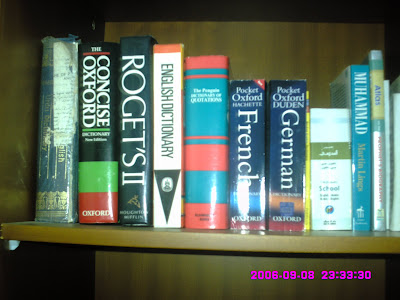
Maulana Maududi's tafseer in English.
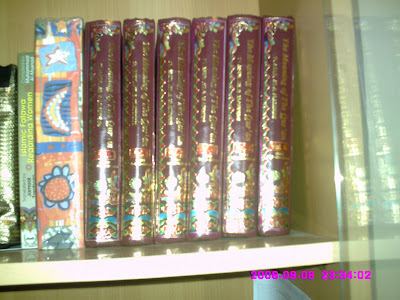
Books on hadith and sunnah:

Hmm... I wonder if cookbooks can be considered part of a bookshelf? But they're definitely part of me, since I believe in healthy cooking and a diet of abundance. The one book missing here is You are What you Eat by Dr Gillain McKeith. She's the world's best nutritionist. I had ordered 5 copies of this book for friends. It's an absolute must-have. I haven't touched most of these books since I moved back to my parents as mummy does all the cooking.
The book above the Juicing Bible is Healthy Eating for your Heart [I think...]. The Juicing Bible was a gift from my best friend Fatima... for the love of smoothies :)
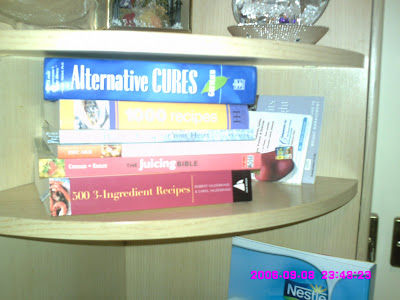
All the above books are in shelves outside my room. Here are the ones on my desk:
John Maxwell is a star. Inshallah one day I'd like write a book like his on leadership, but from an Islamic perspective. After meeting Dan Shapiro, from the Harvard Negotiation Project personally, I had to get his books! Beyond Reason is an excellent book on communication, and together with the Conflict and Communication workbook, you're very well-equiped with skills to negotiate your way through any argument. I haven't read the 7 Habits of Highly Effective People by Stephen Covey that everyone has read, because I found it.. complicated and didn't have the patience @ that time to read it because... there isn't a better book by the Franklin Covey company than the 7 Habits of Highly Effective Teens. I can read that book over and over again. It's an absolute delight. I haven't finished reading Getting Things Done, inshallah in Ramadan since that's when I try to do a lot of planning.
A couple of these books were gifts from my wonderful friends.
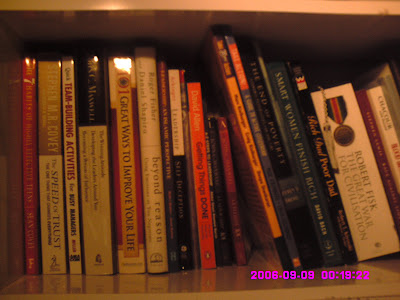
Next to that, are books on social causes that I want to be aware about- Africa, poverty, Palestine, Middle East and Activism. Take Action and Take More Action are two wonderful books written for all age groups on plans, letters, ideas, etc for making a difference in your community. These books were written by two 12 year olds, Marc and Craig Keilburger.. they're probably my age now. I haven't read a few from these...
And then, some random fiction. I have very little time to read good books, so I avoid fiction, but I'd definitely buy all of Paulo Coelho books. Like the Flowing River is the inspiration for the Matters of the Rock series.
Founders at Work is a book that talks about... 30 founders of IT companies. Nice read. I bought it after Guy Kawasaki recommended it.
There are a few little books for lifting anyone's mood: Eeyore's book of gloom, 7 Habits of Highly Effective People, Qur'anic treasures and more...
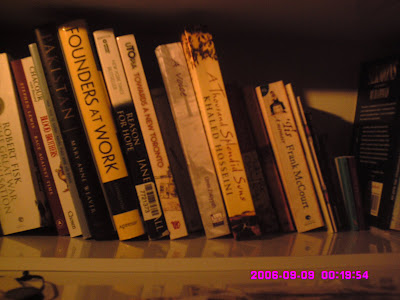
Books I use for Shariah program, SunniPath and the
Arabic Learner's blog, from the Hans Wehr dictionary, Arabic grammar books to the famous Stories of the Prophets. Vocabulary of the Holy Qur'an is my main source of reference for the Arabic Learner's blog.
Under the books for learning Arabic, are my course books for the CanFitPro certification that I completed this year. Strength Training Anatomy is a very comprehensive book on muscular conditioning. And the last set of binded books are from the Almaghrib Institute.
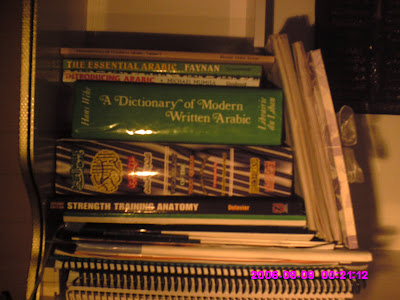
I subscribe to magazines by CanFitPro and Toastmasters Intl (again, apologies about the picture):
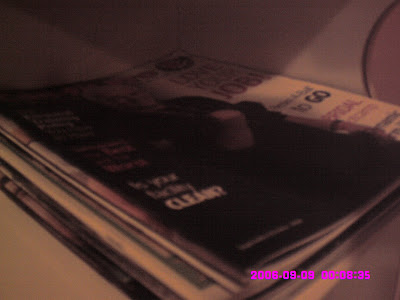
And finally, in the glass shelf above all these books, are mostly books about Islam. I haven't read many of these, but from those that I have, I've learnt a lot Alhamdulillah. I haven't read any of the Harun Yahya book, and I'm not sure why I bought them in the first place. I love the writings of Maulana Wahiduddeen Khan- very simple yet powerful. May Allah (swt) bless the scholars. His An Islamic Treasury of Virtues has been my main source of reference for my Glimpses into the Life of Umar Farooq blog. Dr A'id Al Qarni seems to be a popular writer in Saudi/UAE. My sister gifted me his You can be the Happiest Woman in the World.
Hammad, there's one of your favourite books too ;)
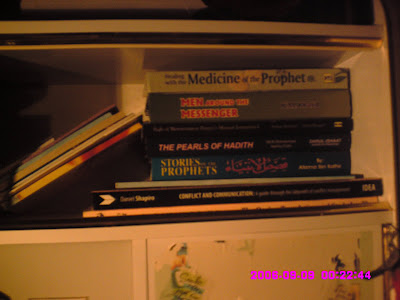


And thus it ends here. My Engineering books are missing. They're still lying in Toronto...
Let's see now... to do my part of tagging, I choose Sheepoo of Internals, and Sayam of Tranquil. Tariq of.. what's your blog's name? :P MTR's Musings I know you're trying to blog somewhere. And of course, my favourite, Raheel of Intellijunkt Commentary if you're back and 2 inches taller.
And my two best friends, Asma of Asma Maryam Ali and Sawitri of Life is a journey, so where are you going?- I've seen your massive bookshelves, perhaps you can showcase a section of your favourite books online? Especially since we don't have many books in common.
Finally, the ultimate traveller, the friendly Ozair of The Blog about Nothing :)
This was hard to do, mostly because I don't read most books with 100% attention, and there are many that I haven't even started on. I probably only have 30-40% of the information in my head, and I can't say I implement much of it...
I also have a collection of audio CDs, but let's not go there.. Oops.. did I give another tagging idea to Hafsa? :P
 Yesterday, at fajr time the sky was simply beautiful. Through the date palm tree branches, I caught glimpses of the twinkling stars. I made dua for sometime. Growing up, the moon always resembled a 25 fils coin. Somehow, the visible craters looked like the deer in the coin.
Yesterday, at fajr time the sky was simply beautiful. Through the date palm tree branches, I caught glimpses of the twinkling stars. I made dua for sometime. Growing up, the moon always resembled a 25 fils coin. Somehow, the visible craters looked like the deer in the coin.







